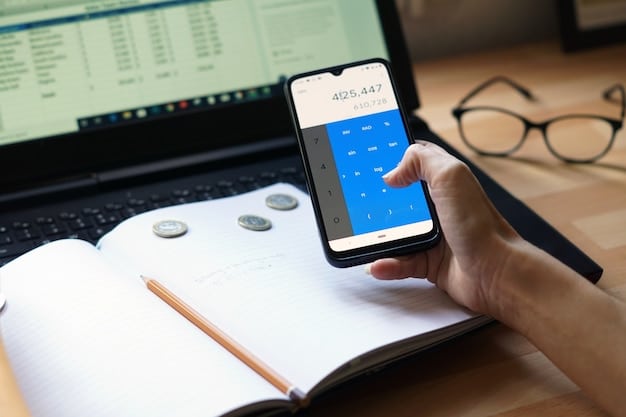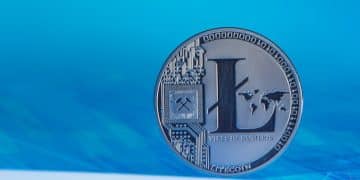Solana Wallets: Secure & User-Friendly Choices for Your Needs

Solana ecosystem wallets are essential for managing your SOL and other Solana-based tokens securely and efficiently, offering various features tailored to different user preferences and security needs.
Choosing the right Solana ecosystem wallet: Choosing the Right Wallet for Your Needs with a Focus on Security and Usability is crucial for anyone engaging with the Solana blockchain. Understanding the different types of wallets available, their security features, and usability aspects can significantly enhance your experience within the Solana ecosystem.
Understanding Solana Wallets: A Beginner’s Guide
To navigate the Solana ecosystem effectively, it’s vital to understand what Solana wallets are and how they function. These wallets are not just repositories for your SOL tokens; they are your gateway to decentralized applications (dApps), DeFi platforms, and the broader Solana blockchain.
A Solana wallet enables you to interact with the Solana blockchain. It stores your private keys, allowing you to sign transactions, manage your digital assets, and access various decentralized services within the ecosystem.

Key Features of Solana Wallets
Solana wallets come equipped with a range of features designed to enhance user experience and ensure the security of your assets. Here are some key features to consider:
- Security: Robust security measures such as encryption, multi-factor authentication, and hardware support are crucial for protecting your private keys and funds.
- Usability: A user-friendly interface and seamless integration with Solana dApps and DeFi platforms are essential for a smooth and efficient experience.
- Token Management: The ability to easily manage and track your SOL and other Solana-based tokens, including SPL tokens, is a fundamental feature.
- Staking Support: Many Solana wallets offer built-in staking functionality, allowing you to earn rewards by staking your SOL tokens directly from your wallet.
These features collectively contribute to a secure and user-friendly environment for managing your digital assets within the Solana ecosystem.
In summary, Solana wallets are essential tools for anyone looking to engage with the Solana blockchain. They provide a secure and user-friendly way to manage your digital assets, access decentralized applications, and participate in the broader Solana ecosystem.
Types of Solana Wallets: Finding the Right Fit
The Solana ecosystem offers a diverse range of wallets, each catering to different user needs and preferences. Understanding the various types of wallets available can help you choose the one that best suits your security requirements and usage habits.
Solana wallets can be broadly categorized into hardware wallets, software wallets (including browser extensions and mobile apps), and custodial wallets. Each type offers a unique balance of security, convenience, and control.
Hardware Wallets
Hardware wallets are physical devices that store your private keys offline, providing the highest level of security. They are generally considered the most secure option for storing your Solana assets.
- Ledger: Ledger Nano S and Ledger Nano X are popular hardware wallets that support Solana and allow you to securely manage your SOL tokens.
- Trezor: Trezor Model T is another reputable hardware wallet that offers Solana support and advanced security features.
- Key Features: Offline storage, secure element chips, and physical confirmation of transactions.
Hardware wallets are ideal for users who prioritize security and are willing to invest in a dedicated device for managing their digital assets.

Software Wallets: Convenience at Your Fingertips
Software wallets are applications that store your private keys on your computer or mobile device. They offer a balance of security and convenience, making them a popular choice for everyday use.
Software wallets can be further divided into browser extension wallets and mobile app wallets, each offering unique advantages.
Browser Extension Wallets
Browser extension wallets integrate seamlessly with your web browser, allowing you to easily interact with Solana dApps and DeFi platforms directly from your browser.
- Phantom: Phantom is a widely used Solana browser extension wallet known for its user-friendly interface and seamless integration with Solana dApps.
- Solflare: Solflare is another popular browser extension wallet that offers a range of features, including staking support and hardware wallet integration.
- Key Features: Easy access to dApps, convenient transaction signing, and support for multiple Solana-based tokens.
Mobile App Wallets
Mobile app wallets allow you to manage your Solana assets on the go, providing convenient access to your funds from your smartphone or tablet.
- Trust Wallet: Trust Wallet is a multi-currency mobile wallet that supports Solana and allows you to store and manage your SOL tokens on your mobile device.
- Exodus: Exodus is a desktop and mobile wallet that offers Solana support and a visually appealing interface.
- Key Features: Mobile accessibility, QR code scanning for easy transactions, and support for a wide range of cryptocurrencies.
Software wallets are a great option for users who value convenience and accessibility. However, it’s crucial to take necessary security precautions, such as enabling two-factor authentication and keeping your software up to date.
Choosing the right type of wallet depends on your individual needs and risk tolerance. Consider factors such as security, convenience, and the frequency with which you plan to access your Solana assets.
Security Considerations: Protecting Your Solana Assets
Security is paramount when choosing a Solana wallet. With the increasing sophistication of cyber threats, it’s crucial to understand the security features offered by different wallets and take necessary precautions to protect your assets.
Hardware wallets generally offer the highest level of security, as they store your private keys offline. However, software wallets can also be secure if you take appropriate measures.
Best Practices for Securing Your Solana Wallet
Regardless of the type of wallet you choose, there are several best practices you should follow to enhance the security of your Solana assets:
- Enable Two-Factor Authentication (2FA): 2FA adds an extra layer of security by requiring a second verification code in addition to your password.
- Use a Strong Password: Choose a strong, unique password that is difficult to guess and avoid reusing passwords across multiple accounts.
- Keep Your Software Up to Date: Regularly update your wallet software and operating system to patch security vulnerabilities.
- Be Wary of Phishing Scams: Be cautious of phishing emails, messages, or websites that attempt to trick you into revealing your private keys or seed phrases.
By following these best practices, you can significantly reduce the risk of theft or loss of your Solana assets.
Understanding Seed Phrases and Private Keys
Your seed phrase and private keys are the most critical pieces of information associated with your Solana wallet. They are essentially the keys to your kingdom, and anyone who gains access to them can control your funds.
- Seed Phrase: A seed phrase is a set of 12 or 24 words that serves as a backup for your wallet. It’s essential to store your seed phrase in a safe and secure location, preferably offline.
- Private Key: A private key is a unique cryptographic key that allows you to sign transactions and access your Solana assets. Never share your private key with anyone.
Losing your seed phrase or private key can result in the permanent loss of your Solana assets. Therefore, it’s crucial to take extra care in securing this information.
In conclusion, security should be your top priority when choosing and using a Solana wallet. By understanding the security features offered by different wallets and following best practices, you can protect your assets from potential threats.
Usability and User Experience: Making Solana Accessible
While security is paramount, usability and user experience are also important factors to consider when choosing a Solana wallet. A wallet with a user-friendly interface and seamless integration with Solana dApps can significantly enhance your overall experience.
A well-designed wallet should be easy to navigate, even for users who are new to the Solana ecosystem.
Here’s how usability enhances the Solana experience:
- Streamlined Transactions: Easy to understand transaction processes ensure quick and hassle-free operations.
- Intuitive Interface: A clear and straightforward design makes managing your assets and interacting with dApps seamless.
- Accessibility: User-friendly wallets encourage wider adoption by making Solana accessible to a broader audience, regardless of technical expertise.
A positive user experience encourages greater participation and engagement within the Solana ecosystem.
Choosing a wallet with good usability ensures a smooth and enjoyable experience when interacting with the Solana blockchain.
Comparing Popular Solana Wallets: Features and Security
The Solana ecosystem boasts several highly regarded wallets, each offering a unique set of features and security protocols. Comparing these wallets can help you make an informed decision based on your specific needs.
Here’s a detailed comparison of popular choices to guide your selection.
Wallet Comparison Checklist
- Security Measures: Compare security practices like two-factor authentication, hardware integration, and cold storage options.
- Supported Tokens: Ensure the wallet supports all the tokens you plan to use, including SOL and all SPL tokens.
- User Interface: Evaluate the user interface for ease of use and accessibility, checking for clear navigation and intuitive design.
Popular Options to Compare
- Phantom: Known for its smooth integration with Solana dApps, staking support, and overall user-friendliness.
- Solflare: Highly secure, offering hardware wallet support and staking options. It’s ideal for users prioritizing strong security measures.
- Trust Wallet: A multi-currency mobile wallet with broad token support and a user-friendly mobile experience.
Take the time to research user reviews and test each wallet before making a final decision.
Future Trends in Solana Wallets: What to Expect
The landscape of Solana wallets is constantly evolving. Staying informed about the latest advancements and emerging trends can help you anticipate future developments and choose a wallet that remains relevant and secure.
The future is bright, with enhancements and new features anticipated to meet growing user demands.
Emerging Enhancements
- Cross-Chain Interoperability: Wallets are increasingly prioritizing interoperability to facilitate movement between different blockchain ecosystems.
- Improved Security: Advanced measures like multi-party computation (MPC) and biometric authentication are being incorporated to further enhance security.
- Enhanced User Experience: Expect more intuitive interfaces with integrated educational resources and efficient transaction management.
What the Future Holds
The future of Solana wallets promises greater security, more seamless user experience, and enhanced integration within the broader blockchain ecosystem. Staying current with these trends will empower you to choose the best wallet for your needs.
| Key Point | Brief Description |
|---|---|
| 🔑 Security | Protect your assets with strong passwords and 2FA. |
| 📱 Usability | Choose a wallet with an intuitive interface for smooth transactions. |
| 🛡️ Hardware Wallets | Offer the highest security by storing keys offline. |
| 🌐 Cross-Chain | Future wallets will improve interoperability across different blockchains. |
Frequently Asked Questions
▼
A Solana wallet is a tool used to manage, send, and receive SOL tokens and other Solana-based assets. It stores your private keys, allowing you to interact securely with the Solana blockchain and its dApps.
▼
Consider factors like security requirements, ease of use, and how frequently you plan to access your assets. Hardware wallets offer the highest security, while software wallets provide more convenience.
▼
Enable two-factor authentication (2FA), use a strong and unique password, keep your software up to date, and store your seed phrase offline in a secure location to prevent unauthorized access.
▼
Yes, many Solana wallets offer built-in staking functionality. This allows you to delegate your SOL tokens to validators and earn rewards directly from your wallet, contributing to the network’s security.
▼
Hardware wallets store your private keys offline, offering superior security. Software wallets, like browser extensions and mobile apps, store keys online, providing greater convenience but requiring more vigilance regarding security.
Conclusion
Choosing a Solana ecosystem wallet: Choosing the Right Wallet for Your Needs with a Focus on Security and Usability requires careful consideration of your personal needs, security concerns, and desired level of convenience. By evaluating the different types of wallets and their security features, you can make an informed decision that enhances your experience within the Solana ecosystem.





